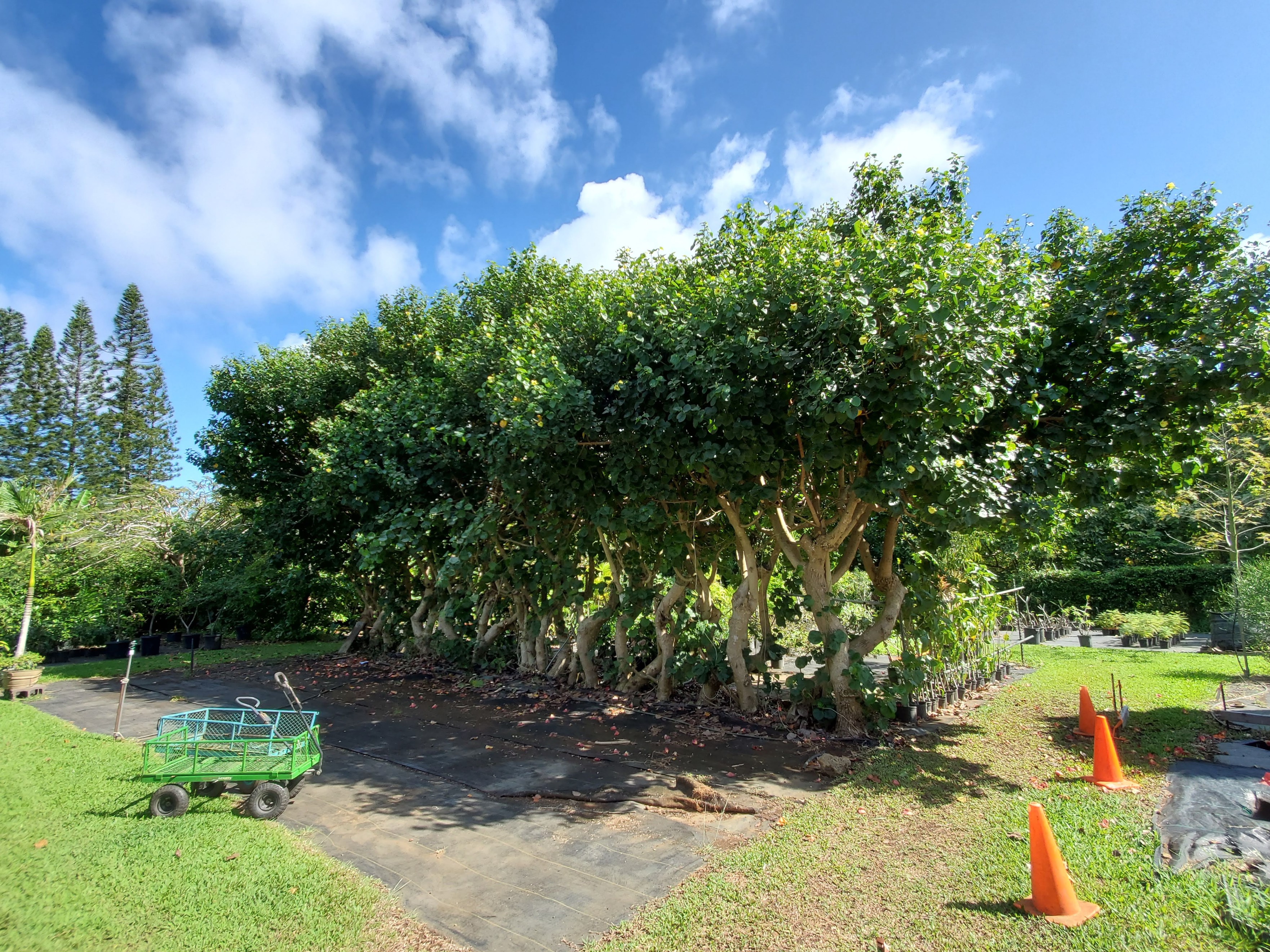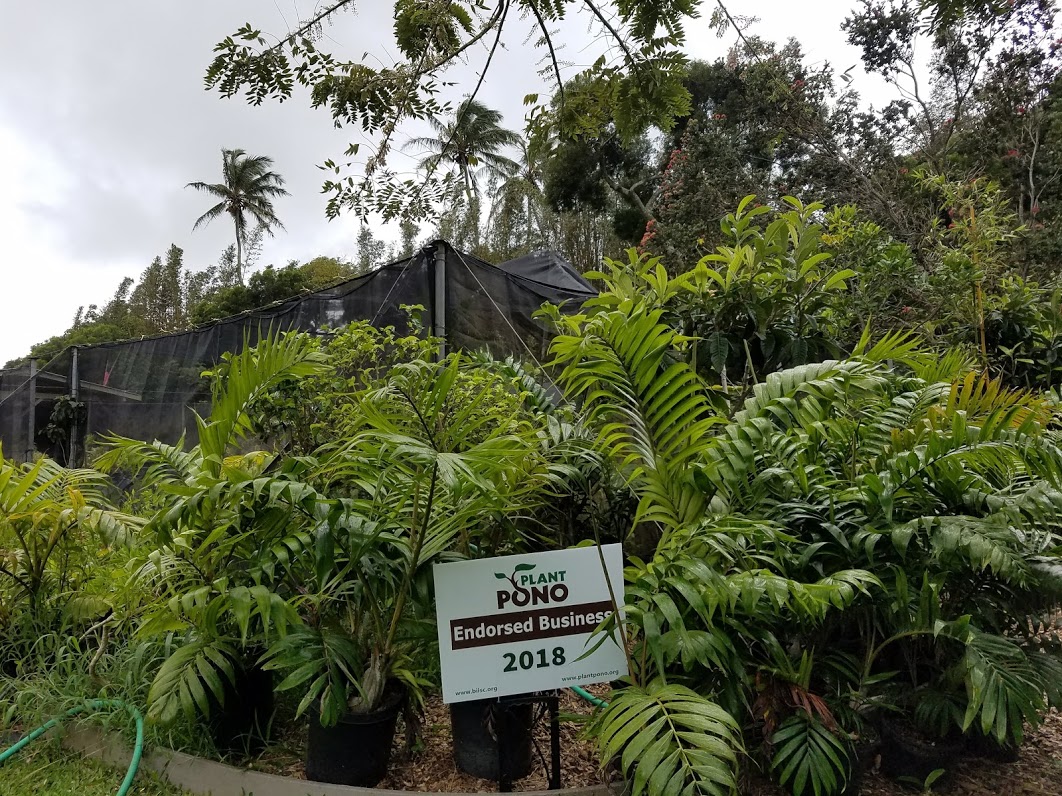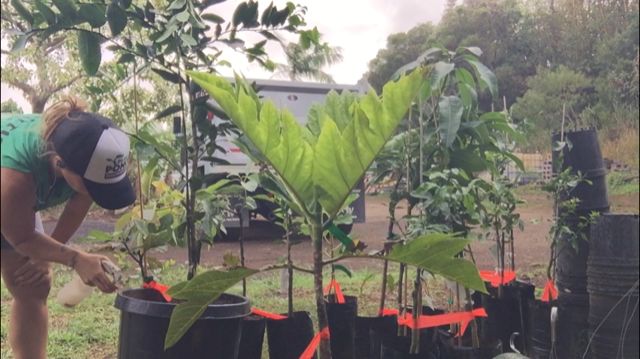“Every time you say a native plant’s name, it gives life and breath to that plant,” said Brad Belmarez, co-owner of Aikane Nursery and Landscaping. The family-run business no longer uses botanical names for plants in favor of their Hawaiian names. Located in Hawi in the Kohala district of Hawai’i Island, Aikane Nursery and Landscape is passionate about native plants and the local economy.

“Native plants do so much better in natural and landscaped areas. They can handle the elements. Not many plants still look good with the whipping winds of Kohala,” explained Kelly Hyde, nursery manager at Aikane. She particularly likes the dwarf hau. “This hau does not drop much leaf litter. It looks so much cleaner underneath compared to other trees.”
As a Plant Pono endorsed business Aikane has voluntarily agreed not to sell invasive plants, an exemplary act as there is surprisingly little regulation to prohibit the sale of invasive plants in Hawaii. Now Aikane is taking it a step further by selling off their non-native stock in favor of a native-only nursery! Aikane had started out selling only natives and now returns to those roots.
By definition, a native plant can never be invasive (even though some people would consider a few species to have “weedy” tendencies). “I like to educate the community about native plants,” said Belmarez. “I like sharing the unique stories of each plant.” He describes native plants with words like “subtle” and “spiritual,” and appreciates the connection that Native Hawaiians have always had with all the living things in their world.
It’s unfortunate (and confusing to some newcomers and residents) when a Hawaiian name becomes the common name for invasive plants. For instance, Hedychium gardnerianum, known as kahili ginger, escaped cultivation less than 100 years ago. It was given a “Hawaiian” name by a salesperson who wanted to encourage purchases! On Hawai’i Island, this notorious worldwide invader plant is now taking over the cloud forests of the Kohala mountains, the native forests of Laupāhoehoe, and the rainforests of Kīlauea. It forms mats of roots that prevent the percolation of water into the watershed and blocks the growth of native seedlings. Too many of our current pest plants were once spread intentionally as horticultural species, and that trend still continues today.

Like other Plant Pono-endorsed nurseries, the team at Aikane won’t sell plants that escape cultivation. They know that some invasive plants directly destroy the ecosystem services we depend on every day. In the nursery, the team takes the time to explain to customers why they won’t sell invasive plants. These conversations strengthen the bond people have with their plants. And according to a 2017 survey conducted by the Big Island Invasive Species Committee (BIISC), more than 90% of customers state that they do not want to plant an invasive. It just takes a conversation!
Invasive pests are another problem for our islands, and Aikane takes those seriously as well. The crew regularly surveys for little fire ants (LFA). These pesky invasive ants hitchhike in potted plants, house kits, roofing, cars – anything that sits for a long time. Nurseries must be vigilant. Prevention is the best and cheapest way to fight invasive species; early detection is second-best. Hyde tests all incoming plants for LFA while they are still on the trailer, a perfect yet temporary quarantine zone. This is also an opportunity to spray the plants with citric acid to control coqui frogs. Despite being on the Big Island, North Kohala is still relatively free of coqui frogs, and Aikane wants to keep it that way.
Doing business in the Kohala community has been a good fit for Aikane Nursery and Landscaping in fulfilling their commitment to planting pono. “Most Kohala people are open to learning about native species,” Brad said. The landscaping side of the business is booming. Aikane employs 23 local people and is committed to a fair wage. “It’s a bit difficult because bigger operations set the price, and it’s low,” said Belmarez, “We produce quality work because we pay a living wage…Long-term and well-paid employees means we show up on time with a full crew ready to dig in and complete the job.”

Recently, Aikane Nursery and Landscaping put in a bid to remove the invasive Clusia rosea or autograph tree, from area resorts. The autograph tree is a big problem on Hawai’i island. Bird dispersed fruit and an epiphytic nature have led to widespread autograph tree invasion into both cultivated landscapes and natural areas. It is not uncommon to see autograph tree growing epiphytically in various trees. This emerging invasive species has the potential to become a severe problem. That’s why the autograph tree is on Plant Pono’s ‘no grow’ list. Currently, there are no known ways to control this species, which is also a problem in Florida, Texas, and other countries. Herbicide trials have yielded unsatisfactory results. Sap exudes with The ‘Hack and Squirt’ method preventing the uptake of chemicals. Aikane Nursery and landscaping will use heavy machinery to remove the obnoxious tree.
“People are missing that connection to the unique plants that belong in this place,” Balmarez says. “It’s devastating to see how invasive plants have taken over.” In all aspects of their business, Aikane is demonstrating a commitment to protecting Hawai’i from invasive species and to healing the island, one plant at a time.
The Plant Pono endorsement program is available on Kauai and Hawaii islands. Molly Murphy is the Plant Pono Specialist for the Big Island Invasive Species Committee. For questions on Plant Pono or invasive plants, contact her at mollym3@hawaii.edu



